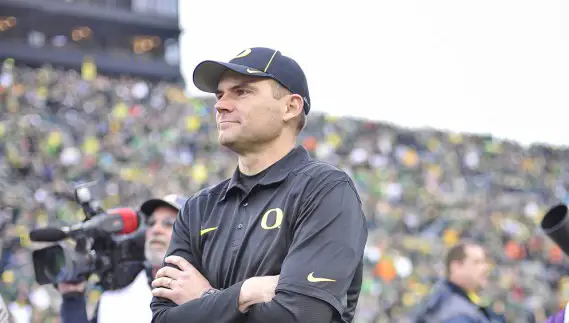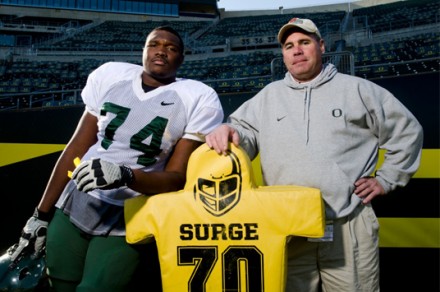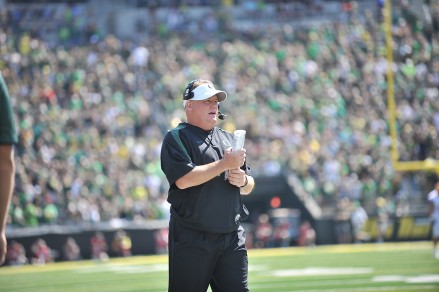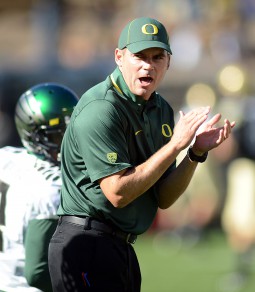Is Mark Helfrich a better recruiter than Chip Kelly? That question has slowly crept into the minds of Duck recruiting fanatics as the early commitments have seemingly poured in over the last few weeks. Earlier this week, writing for Duck Sports Authority, I talked about the change in early commitments not being significantly different for the Ducks. At the time I wrote that, the Ducks had eight early commitments for the 2015 recruiting class. While that is more than average for Oregon, it was not a significantly higher number.
Then, a surprise. The commitment of Missouri’s number one rated prospect for 2015, Alex Ofodile, a 6-1, 201 lb. wide receiver, came from out of the blue. Though he had been lightly discussed as a true Oregon prospect, an unofficial visit last week, which escaped the radar of all the major recruiting services, suddenly led to a surprise commit for the Ducks. And then the question was raised: Is Mark Helfrich a better recruiter than Chip Kelly?
Answering that is a very difficult task. First, defining the term “better” is a nebulous chore which almost assuredly leads to disagreements. Nonetheless, we will at least look at the advantages and disadvantages of the two coaches.
Kelly had an aura about him that Helfrich is unlikely to acquire. Kelly was a larger-than-life personality whose “mad scientist” approach rocked the core of college football. Ask Nick Saban and Brett Bielema who, protestations to the opposite notwithstanding, were deeply committed to changing the rules of college football. Kelly’s “blur” pace stuck in their craw. While that aura got Kelly into quite a few more living rooms than he might have otherwise landed, the recruiting itself was not something Kelly enjoyed. He wanted to be that mad scientist, not the glad hander.
In addition, as part of his mad scientist approach, Kelly was a micro-manager. Nothing, and I mean nothing, was done within the program without Kelly’s approval and that included scholarship offers. Kelly insisted on reviewing every scholarship offer.
That is incredibly time consuming. While the Oregon vetting process for making offers is highly regarded as one of the most thorough around, it was slowed by this micro managing. In an age when more and more kids are making their decisions early, this is a dangerous game of recruiting chicken.
Helfrich has relinquished some of that control, putting a little more trust in his assistant coaches. This doesn’t mean that the assistants have full autonomy, but they do have a little more flexibility in making offers. They also have the ability to do some of that vaunted vetting process on their own rather than having to wait for the head man to get around to each potential recruit. This is enabled by preset standards established by Helfrich in conjunction with one of the longest-tenured staffs in college football. This kind of trust has seen offensive line coach Steve Greatwood flourish on the early recruiting trail. With five commitments in his group already, Greatwood has set an example to be envied by every assistant coach on staff.
Helfrich has another major advantage in that he enjoys recruiting. He enjoys going into a home, establishing the relationships with the family and making lasting connections. Family and their opinions matter. This is not a necessary evil in his mind, it is the whole point of college football.
College football is steeped in tradition. With all of the television money and huge coaching contracts, we sometimes lose sight of the real value and purpose of college football: taking boys and helping develop them into strong men. Along the way they learn the values of hard work, dedication and teamwork. This is why college football exists and it is something Helfrich values more than any plays he can draw up in a meeting.
Chip Kelly built a mini-legacy of stealing super-star players late in the recruiting process. Players like De’Anthony Thomas, Bralon Addison and Josh Huff were a few late steals who had been committed elsewhere.
Helfrich has proved no slouch in that category either securing a late commit from Cameron Hunt in 2013 or the even later commitment for the 2014 class of Eddie Heard. Helfrich has not landed the consensus five-star player — yet. Nonetheless, he has taken the recruiting momentum built by nearly a decade of brand improvement nationwide and expanded upon that base. The Ducks have landed early commitments from Georgia and Missouri as well as the No. 2 player from the State of Washington.
All of this does little, of course, to answer the question as to which of the two is the better recruiter. If we base it on who had the highest rated class, that distinction goes to Kelly’s 2011 recruiting class widely regarded as the best Oregon class ever.
Despite that numerical success, Helfrich has taken the recruiting head on. He has changed a lot of the methodology and is working very hard to change the way Oregon recruits — again. Helfrich enjoys the process more and is likely to make stronger ties with the families.
Helfrich has one other advantage in recruiting: a lack of rumors. For nearly the entire tenure of Chip Kelly, from that first star-crossed season as offensive coordinator through his rapid rise to the hottest coaching commodity this side of the SEC, the rumors surrounding his inevitable departure were always a weapon against the Ducks in recruiting wars. No such rumors will follow Helfrich on the recruiting trail. I think it is well established by Hefrich’s own words that, for him, Oregon football truly is the pinnacle. He is not leaving for the NFL; he is not leaving Eugene for the “bigger fish” job. He is at Oregon as long as they will have him. Trust me, that is a strong selling point.
Stability. And that may be the biggest difference right now. Hefrich is now synonymous with stability at Oregon.
Is Mark Helfrich a better recruiter? Impossible to say. He does, however, enjoy the process more. And that comes through in living rooms. In the long run that may lead to even more success as a recruiter. It is too early to claim Helfrich is a better recruiter, but with time on his side, this may end up as more of a rhetorical question than intended.
Related Articles:
Chip Kelly Update: Everything's Good Again ...
Chip Kelly Update: Wailing and Gnashing of Teeth
Shock and Awe -- The Oregon Ducks' Football Hangover Effect
Despite Lopsided Score, Georgia State "Never Stopped Believing"
Hope Springs Eternal for Ducks
Incompetent Pac-12 Officials: How Do You Miss ALL of THIS?
Scott Reed has been a fan of the Ducks from his first days listening to Wendy Ray in 1974 on a scratchy AM radio from Oakridge; forty long years of fandom. He has been a long time contributor to Duck Sports Authority and stumbled into formal writing about the Duck program in 2011 when he looked at the “other side” of the Will Lyles investigation. Long known as “Ducks39” on message boards, he branched deeper into writing for Duck Sports Authority covering games and recruiting for the last four seasons.
Scott works for Roush Industries in Portland as the Operations Supervisor. He received a Bachelor of Science in Management from the University of Oregon in 1994 with honors. Scott is also a long time power lifter who spent time as an Assistant Strength Coach at the University of South Dakota.
He and his wife live in Beaverton. Scott has two grown sons and two step-sons. In what spare time he has left, he likes to read philosophy and lift weights.





